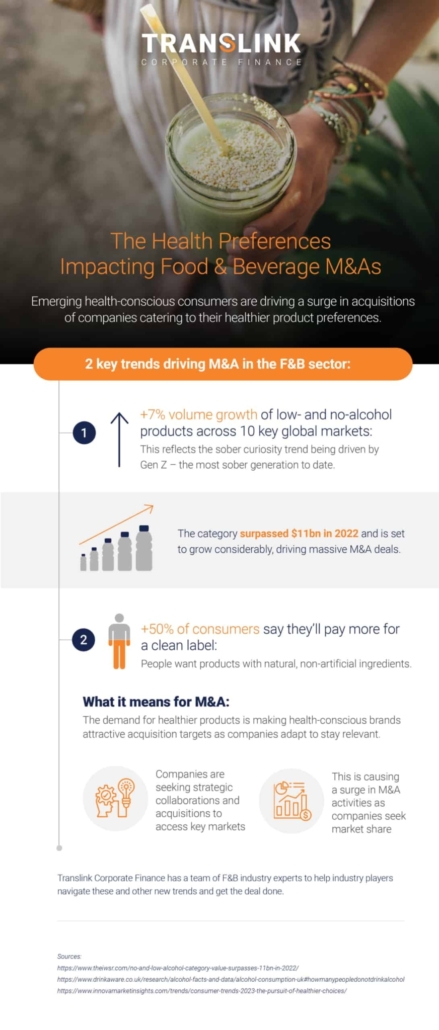August 01, 2023
The global food and beverage industry is evolving, fuelled by consumers’ growing appetites for healthier products and non-alcoholic beverages. With younger generations wielding increasing buying power and being conscientious about their choices’ impact on their health and the environment, the industry must adapt.
Deger Becer, Partner at Translink Corporate Finance Turkey explores how this evolution impacts the mergers and acquisitions (M&A) sector as companies scramble to align with these trends to remain competitive and attract strategic buyers and investors.
“Globally, more consumers prefer products that enhance their health and well-being, as reflected in the rising popularity of non-alcoholic beverages and low-carb and weight-management food products. This shift has resulted in a surge in acquisitions of food and beverage companies that cater to these healthier preferences. These acquisitions allow traditional food and beverage companies to diversify their portfolios and capitalise on this growing consumer market.”
The healthy generation
The rise of no- and low-alcohol beverages indicates increasing consumer interest in healthier products. New IWSR data reveals that no- and low-alcohol products grew by more than 7% in volume across 10 key global markets in 2022. This beverage category surpassed $11 billion in market value in 2022, with non-alcoholic beverages accounting for 90% of this growth.
The growing ‘sober curiosity’ trend (choosing to avoid alcohol for personal or wellness reasons) among Gen Z amplifies this movement. According to a 2022 Drinkaware study on alcohol consumption trends, Gen Z is the most sober and sober-curious generation yet.
“Changing beverage and food preferences have prompted companies to create new product lines, collaborate with other brands, and scale back on dwindling trends. This adaption is becoming a critical factor influencing strategic decisions in M&A, with health-conscious brands becoming attractive targets for acquisitions,” adds Becer.
Innova Market Insights also reveals an increase in consumers’ preferences for clean labels (products with short ingredient lists, natural ingredients, and no artificial ingredients), with more than 50% of consumers saying they are willing to pay more for a clean label.
The impact of shifting consumer trends on M&A
The consumer shift towards health and wellness creates new opportunities in the food and beverage industry. It opens the door for M&A activity as more companies seek strategic partnerships or acquisitions to mitigate risk, ensure survival, and meet shifting consumer needs in the region.
For example, last year, Dutch chemicals giant Royal DSM merged with Swiss ingredients maker Firmenich in a deal valued at roughly $21 billion. The merger allowed DSM-Firmenich to focus on natural, clean-label products, ingredients for plant-based foods, and options to boost food’s nutritional profile, including vitamins, probiotics, lipids, and solutions to reduce sugar and salt.
In Canada, where non-alcoholic cocktails grew more than 30% in retail sales in 2021, Keurig Dr Pepper acquired the global rights to Atypique, a non-alcoholic, ready-to-drink brand that has a 42% market share of that segment. This acquisition expanded Dr Pepper’s brand growth potential to meet evolving non-alcoholic beverage needs in that market.
The future of M&A in an evolving food and beverage industry
“The growing emphasis on health and wellness creates a dynamic environment where companies must adapt to remain competitive and attractive for strategic acquisitions. With these trends set to continue, we can expect healthier products to remain key drivers in the food and beverage M&A landscape,” adds Becer.
Becer says that as the food and beverage industry adapts to changing consumer preferences, the M&A landscape will evolve. Therefore, the key to success in this environment will be keeping a pulse on consumer preferences to make strategic M&A decisions. Translink is perfectly positioned to help clients navigate and take maximal advantage of this new landscape, with experienced local advisors and a rich global network to tap into.



